Related Research Articles
Acid rock is a loosely defined type of rock music that evolved out of the mid-1960s garage punk movement and helped launch the psychedelic subculture. Named after lysergic acid diethylamide (LSD), the style is generally defined by heavy, distorted guitars, lyrics with drug references, and long improvised jams. Much of the style overlaps with 1960s garage punk, proto-metal, and early heavy, blues-based hard rock.

The Standells are an American garage rock band from Los Angeles, California, formed in the 1960s, who have been referred to as a "punk band of the 1960s", and said to have inspired such groups as the Sex Pistols and Ramones. They are best known for their 1966 hit "Dirty Water", written by their manager, Ed Cobb. "Dirty Water" is now the anthem of several Boston sports teams and is played following every Boston Red Sox and Boston Bruins home win.

The Chocolate Watchband is an American garage rock band that formed in 1965 in Los Altos, California. The band went through several lineup changes during its existence. Combining psychedelic and garage rock components, their sound was marked by David Aguilar's lead vocals, songwriting, as well as proto-punk musical arrangements. The band's rebellious musical posture made them one of the harder-edged groups of the period with many critics labeling them as America's answer to the Rolling Stones.
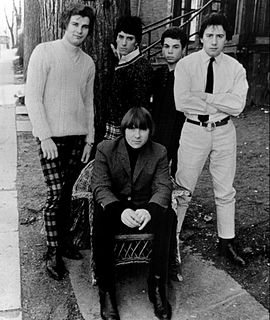
The Outsiders were an American rock and roll band from Cleveland, Ohio, that was founded and led by guitarist Tom King. The band is best known for its hit "Time Won't Let Me" in early 1966, which peaked at No. 5 in the US in April. The band had three other Hot 100 top 40 hit singles in 1966, but none on the Hot 100 beyond then, and released a total of four albums in the mid-1960s.
The Litter was an American psychedelic and garage rock band, formed in 1966 in Minneapolis, Minnesota, United States. They are best remembered for their 1967 debut single, "Action Woman". The group recorded three albums in the late 1960s before disbanding, but they re-united in 1990, 1992, and again in 1998, when they recorded a new studio album consisting of both old and new material. All of their Minneapolis recorded material was produced by Warren Kendrick, who owned the Scotty and Warick and Hexagon labels.

The Chesterfield Kings were a rock band from Rochester, New York, who began as a retro-1960s garage band, and who have heavily mined 1960s music, including some borrowing from the 1960s recordings of The Rolling Stones. Core members were former Distorted Level singer, underground music journalist and avid record collector Greg Prevost, and Andy Babiuk ; others have come and gone. The band, named after a defunct brand of unfiltered cigarette, was instrumental in sparking the 1980s garage band revival that launched such groups as the Unclaimed, Marshmallow Overcoat, The Fuzztones, The Pandoras, The Malarians, Mystic Eyes, The Cynics, The Optic Nerve, the Secret Service, and the Stomachmouths.
Mouse and the Traps is the name of an American garage rock band from Tyler, Texas, United States, that released numerous singles between 1965 and 1969, two of which, "A Public Execution" and "Sometimes You Just Can't Win", became large regional hits. The leader of the band, nicknamed "Mouse", was Ronny Weiss. Two of their best known songs, "A Public Execution" and a cover of "Psychotic Reaction", are not actually credited to this band but, respectively, to simply Mouse and Positively 13 O'Clock instead. Their tangled history also included one single that was released anonymously under the name Chris St. John. The band are not to be confused with the girl group Mousie and The Traps who recorded for Toddlin' Town records around the same time.

No Way Out is the debut album by the American garage rock band The Chocolate Watchband, and was released in September 1967 on Tower Records. It blended both garage and psychedelic rock influences, and was marked by distorted guitar instrumentals that were early examples of protopunk. It features the band's harder-edged interpretations of songs, with only three original compositions. The album was preceded by two non-album singles, "Sweet Young Thing" and "Misty Lane", and track singles, "No Way Out" and "Are You Gonna be There ". However, none of the singles managed to chart. Like its singles, No Way Out failed to reach the Billboard 200, but it established the group as a popular live act, and later became noted as a garage rock classic.

Bohemian Vendetta was an American garage rock and psychedelic band from Long Island, New York, who were active from 1966-1968. In addition to recording two officially released singles and several previously unissued demos, they cut a self-titled album, Bohemian Vendetta, released by Mainstream Records in 1968.
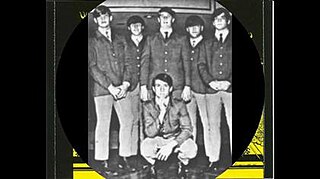
The Lemon Fog were an American garage rock/psychedelic rock band from Houston, Texas who were active from 1965–1970. They were one of the earliest bands to emerge from the Houston psychedelic scene, and recorded several singles for Orbit Records. The group also recorded a handful of outtakes and demos which, along with their issued singles, have been released on the anthology The Psychedelic Sound Of Summer With The Lemon Fog.
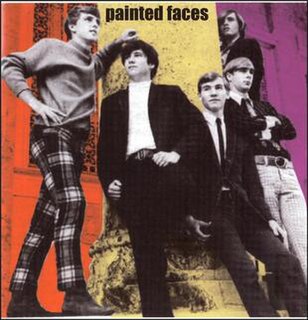
The Painted Faces were an American garage rock/psychedelic rock band from Fort Myers, Florida who were active from 1967 through 1969, who were not only popular in Florida but achieved a following outside of their own region by playing regular shows in New York City and elsewhere. After disbanding they became practically unknown for a number of years, but since the 1980s, with the reissue their songs on various compilations, they have come to the attention of garage rock and psychedelic devotees. They are known for songs such as "Anxious Color", which Mojo magazine named one of the top 100 psychedelic songs of all time.

The Liberty Bell was an American garage rock/psychedelic rock band from Corpus Christi, Texas who were active in the 1960s. They specialized in a blues-based brand of proto-punk influenced by British groups such as the Yardbirds. The band failed to reach wider audience in the time, but have come to the attention of garage rock collectors and enthusiasts in the intervening years since their breakup, with their work appearing on several compilations.

The Stillroven were an American garage rock and psychedelic band from Robbinsdale, Minnesota, outside of Minneapolis, who were active in 1965-1969. They became a local success, enjoying a hit in the Twin Cites area with their version of "Hey Joe". In hopes of reaching a wider audience they relocated, playing for a short time in Tucson, Arizona, but eventually moved their base of operations to Denver, Colorado, where they briefly signed to A&M Records, recording an unreleased album for the label. The group made recordings at Norman Petty's studio in Clovis, New Mexico, before moving to Washington, DC in 1969 and auditioning in New York City to secure another recording arrangement that never materialized. In the intervening years since their breakup in 1969, the group's work has attracted the attention of garage rock and psychedelic enthusiasts and has been included on various re-issues and compilations.
Green Crystal Ties, Volume 5: Gems from the Garage Band Vaults is the fifth installment in the Green Crystal Ties series of psychedelic and garage rock compilations issued by Collectables Records. It was released on April 7, 1998 and like volume 1 features songs by obscure bands who recorded in the 1960s. The series is known for good quality mastering and sound quality. Like all of the entries in the series, the highly colorful packaging is designed by Nicole Ruhl Fichera. The inner sleeve includes well-researched liner notes written by Steve Kaplan and Matt Wendelken which provide helpful biographical information about the bands and their songs.
The Penthouse 5 were an American garage rock band from Oak Cliff, Texas, a suburb of Dallas and were active from 1964-1967. The band's style was highly influenced by popular British act, such as of the Beatles and the Kinks, as well as the folk rock of the Byrds. In 1967 they shortened their name to the Penthouse and also began to play occasional gigs with a horn section as a soul outfit under the name of Dr. William’s Soul Emporium.
The Nomads were an American garage rock/psychedelic rock band from Texas City, Texas near Galveston who were active in the 1960s. The band was known for Brian Collins' passionate vocals and a melodic guitar sound. They are not to confused with a number of other bands using the same name in Texas and elsewhere, such as the Nomads from Fort Worth and the Nomads from Mount Airy, North Carolina.

The Fe-Fi-Four Plus 2 was an American garage rock band formed in Santa Fe, New Mexico, in 1966. Experimenting with inventive vocal arrangements and fuzz-toned guitar melodies, the group was a forerunner in the musical genre of psychedelic rock. The band released what is commonly agreed by music historians as the first psychedelic single by a native New Mexican group, with their first single "I Wanna Come Back ".
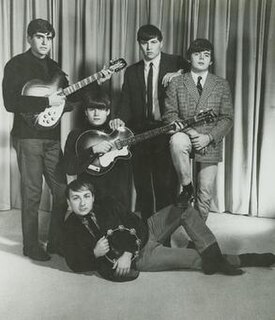
The North Atlantic Invasion Force was an American garage rock band from New Haven, Connecticut who were active in the 1960s. They were led by vocalist and principal songwriter George Morgio, many of whose song lyrics were concerned with interpersonal relationships or were otherwise topical in nature, focusing issues such as free speech and the ongoing war in Vietnam.
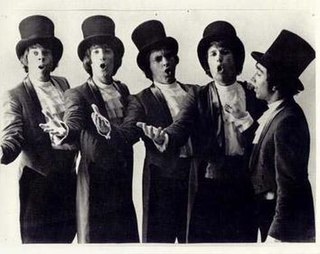
Don and the Goodtimes were an American garage rock band, formed in Portland, Oregon, United States, in 1964. Fronted by Don Gallucci, former keyboardist of the Kingsmen, the group made a name for itself in the Northwest rock scene performing in a similar style as their contemporaries the Wailers and the Sonics. Over time, Don and the Goodtimes honed their vocal harmonies and earned two hits on the Billboard Hot 100 in 1967, including their biggest hit "I Could Be So Good to You". The band released their album, So Good, and later experimented with psychedelia under the moniker Touch before disbanding in 1969.

Leo and the Prophets were an American garage rock band formed in Austin, Texas, in 1966. Like their contemporary the 13th Floor Elevators, Leo and the Prophets experimented with psychedelic music and generated some controversary with their on-stage actions and attire. The band is best-remembered for their lone single "Tilt-a-Whirl", which also was subjected to scrutiny at the time of its original release on Totem Records in 1967. In more recent times, the song has been considered a classic of Texas garage music.
References
- 1 2 3 4 5 6 7 8 9 10 Eder, Bruce. "Movin' Morfomen: Artist Biography". AllMusic. ©AllMusic, member of the RhythmOne group. Retrieved June 28, 2016.
- 1 2 Eder, Bruce. "The Movin' Morfomen - Flashbacks!". ©AllMusic, member of the RhythmOne group. Retrieved June 29, 2016.
- 1 2 3 4 5 6 7 8 Patterson, Beverly (August 24, 2012). "Forgotten series: The Movin' Morfomen – Flashbacks! (1997)". Something Else!. ©Something Else!. Retrieved June 28, 2016.
- ↑ "Flashbacks by Movin' Morfomen (1997-03-25)". Amazon.com. ©Amazon.com, Inc. Retrieved June 28, 2016.